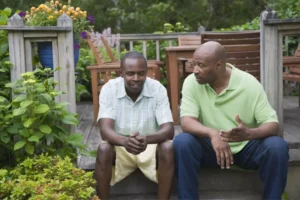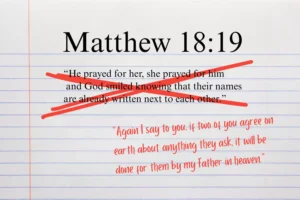Click here to listen to this article.
When I was dating Steve, I read about “the five love languages,” a concept I thought would be a major key to a happy marriage. In a book by the same name, the author says we communicate, and interpret, love in different ways. The broad categories he lists are gifts, acts of service, quality time, words of affirmation, and physical touch. I figured if I could learn what best communicated love to Steve, and let him know what best communicated love to me, we could spend a happy marriage becoming fluent in the other’s “love language.”
My major dialect is gifts. Nothing says “I love you” like an unexpected box artfully wrapped! When Steve gave gifts to me, I felt loved. And when he emptied the dishwasher — an act of service — I felt like he was emptying the dishwasher. Early on, this was a help to understanding what was most meaningful to the other, and what wasn’t. To borrow from another book (His Needs, Her Needs) when he gave me gifts, he was making deposits in my love bank, and when I gave him my undivided attention (quality time), I was building a balance in his. All was well.
Until we didn’t remember to make deposits or speak the right language. Which was often. Especially once we had a baby. It was a lot harder to maintain our hand-crafted romance with a child depending on us and giving us nothing in return for our efforts. I would come into a new day utterly depleted from a sleepless night of feedings and need Steve to love me (sleep deprived, un-showered, short-tempered, postpartum). And he would need me (sleep deprived, un-showered, short-tempered, postpartum) to give him my full attention and physical affection with kindness. At this point, we realized we needed resources beyond love languages and bank balances. We had nothing to give the other — which left us with nothing to get from the other. It was a vicious cycle.
From Taking to Giving
Enter Bruce Brander. We met up with him for a recording where he talked about how love changes over time. He used the language of “need love” and “gift love.” To make a marriage last, he said, you have to mature from always taking, to giving. This matches the progression from high-octane emotions at the start of a romance to a more steady and maintainable affection over the lifetime of marriage. C.S. Lewis described it in “Christian Marriage,” an essay in Mere Christianity. He said,
“‘Being in love’ first moved them to promise fidelity: this quieter love enables them to keep the promise. It is on this love that the engine of marriage is run: being in love was the explosion that started it.”
We move from the phase of intense emotions to one of reliable and enduring love, love that is rooted in the will, not the emotions. This made sense in view of much of what Scripture says love is[note]1 Corinthians 13:4-8[/note], 1 John 3:16 and how it commands us to love one another.[note]John 15:12[/note]
As a Christian, I wanted to faithfully live out the command to love my neighbor;[note]Mark 12:31[/note] be kind and submissive to my husband;[note]Titus 2:5[/note] be a helper well-suited to him;[note]Genesis 2:18[/note] be an asset to him;[note]Proverbs 31:11-12[/note] be his crown, not rottenness in his bones.[note]Proverbs 12:4[/note] In short, I wanted to obey God. But even that desire, by itself, was insufficient to motivate me all the time. I was beset by the same thing Paul was: “for I do not do the good I want, but the evil I do not want is what I keep on doing” (Romans 7:19). How was I going to overcome the sinful desires in me? The ones that wage war in my heart[note]James 4:1-2[/note] and cause conflict?
What happens when you don’t want to love? When your will, which is strong, pulls you in the opposite direction? Where does the ability, the desire, the power to love the unlovable come from?
Obedience Plus
Ephesians 4:31-32 says,
“Let all bitterness and wrath and anger and clamor and slander be put away from you, along with all malice. Be kind to one another, tenderhearted, forgiving one another, as God in Christ forgave you.”
Later Paul writes, “be imitators of God … and walk in love, as Christ loved us” (Ephesians 5:1). Romans 5:8 says, “but God shows his love for us in that while we were still sinners, Christ died for us.”
Love and forgiveness go together.
We tend to think, based on all that we absorb in our daily life in a fallen world, that love is mostly a feeling that is expressed primarily in erotic ways. Sexual intimacy is an expression of love in marriage, but marital love is infinitely more. And satisfying sexual intimacy flows from true love; love that is sacrificial, and above all, forgiving. When we recognize God’s love for us, and our hopeless situation apart from His love, we can begin to truly love another.
Luke 7:36-50 recounts “a woman of the city, who was a sinner,” who anointed Jesus’ feet while he dined at a Pharisee’s house, wetting His feet with her tears and wiping them with her hair. When those at the table were offended by her actions, Jesus said,
“A certain moneylender had two debtors. One owed five hundred denarii, and the other fifty. When they could not pay, he cancelled the debt of both. Now which of them will love him more?”
He was helping them to understand their own cold hearts toward Him.
“You did not anoint my head with oil,”
Jesus said to those at the table,
“but she has anointed my feet with ointment. Therefore I tell you, her sins, which are many, are forgiven—for she loved much. But he who is forgiven little, loves little.”
We who are the children of God are that woman. We are the sinners who have been forgiven much. We owed God an infinite debt we could never repay. Yet He made a way for our debt to be cancelled, for our sins to be forgiven. How then can we not forgive much? How can we not love much? When I start my day thinking about what God has done for me in Christ, when I preach the Gospel to myself again, I’m reminded of the debt I owe. In view of my own great sin and God’s great act of rescue and forgiveness, it’s much easier to extend love and forgiveness to Steve, even when I don’t feel like loving and when he doesn’t seem lovable.
Professor and author Owen Strachan describes the reality of life within marriage. He says,
“As sinners living together under the same roof, husband and wife will annoy one another, hurt one another, and fail to edify one another as they should. Sin and its baggage are not only possible, but inevitable for even the godliest couple. If we pretend otherwise, if we act as if we can bat 1.000 all the time, if we plaster smiles on our faces and project the image of perfection, then we lie to ourselves and to others. Most significantly, we lie to God, who knows the depth of our fallenness and who is justly offended by our sin.”
In view of this, Strachan says there is one key to unlocking the door to a healthy marriage: “humble repentance.”
The way we do that is by first remembering that we have been forgiven much.
Colossians 3:12-13 urges us to
“[p]ut on then, as God’s chosen ones, holy and beloved, compassionate hearts, kindness, humility, meekness, and patience, bearing with one another and, if one has a complaint against another, forgiving each other as the Lord has forgiven you, so you also must forgive.”
We are commanded to forgive. In view of all that God has forgiven us, how can we do anything else?
Not only are we to forgive as we have been forgiven, but also, we must forgive if we wish to be forgiven.[note]Luke 6:37[/note] Pastor and blogger Tim Challies writes,
The Christian has been forgiven for the greatest of offenses. He has been forgiven for knowingly, purposely and unrepentantly transgressing the Law of God. And yet we are often slow to forgive our fellow man for the smallest of transgressions. Even the biggest of the sins committed against us are as nothing compared to how we sinned against God. God does not honor this attitude. In Mark 11:25 Jesus says, “And whenever you stand praying, forgive, if you have anything against anyone, so that your Father also who is in heaven may forgive you your trespasses.” Our ongoing assurance of pardon before the Father is in some way dependent on our willingness to forgive others.
The Cross is Everything
We must forgive one another as we have been forgiven. This is required of all believers, not just those who are married to each other. Which is good news, because forgiveness is required of all of us, whatever our marital status. If you’re not yet married, you can practice the forgiveness that is an essential mark of Christian marriage and one of the key ingredients of a happy home. The more we practice forgiveness before marriage, the better able we’ll be to forgive in marriage, where forgiveness should be the defining characteristic of our unions. Why? Because Christian marriage was designed by God to refer to, or be a picture of, Christ and the church. Meditating on Christ’s sacrificial love, on what He has forgiven you at the price of His own life, is the key to forgiveness in marriage.
Steve still gives me gifts, knowing how much I appreciate them, and I still work to carve out uninterrupted, undistracted quality time with him, knowing what it means to him. But those aren’t the primary things that fuel our love for one another. The fundamental source of our loving and forgiving relationship is Christ’s love for us. I used to think that when my love bank was getting low on funds, I needed to let Steve know so he could fill it. Now when I feel in need of a deposit, I go to the Father, as His beloved child, to be filled from His infinite supply.
God’s love can never be exhausted. If He did not spare His own Son, how will He also not give us all things?[note]Romans 8:32[/note] It’s as His dearly loved child that I’m able to love Steve, on the days when I feel like it, and the ones I don’t. (And by God’s good design, the more we walk in these truths, the more days we have where we feel like it.) Meditate on the cross, on what has already been done; remember — do not forget — how much you are loved! This is true whether you are single or married. It is from that inexhaustible supply of God’s love — displayed in Christ’s death on the cross for our sin — that we draw the strength we need to forgive.
Copyright 2013 Candice Watters. All rights reserved.











